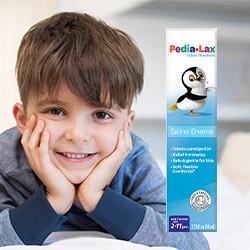
Everyday Regularity
Staying Regular is Toot-ally Pooptastic
Staying regular isn't always easy, but these simple steps help support good gastrointestinal health so your kids can be #1 at going #2.
-
Drinking plenty of water can help regulate constipation.
-
Encourage high-fiber foods such as whole grains, fruits and vegetables.
-
Avoid giving your child large amounts of foods that could lead to constipation. Every child is different. Discuss dietary changes with your pediatrician.
-
Help your child set up a regular toilet routine.
-
For the younger child, reward them for attempting to have a bowel movement and for successfully having a bowel movement (sticker charts, etc.).
-
Be attuned to your child's body and behavior. For instance, if a younger child exhibits symptoms such as clenching buttocks or crossing legs, help them to the bathroom. If yop child is soiling his underpants and hiding them in embarrassment, address the issue with your child in a sensitive manner.
-
Discuss your child's feelings with them in an empathetic manner. Children, at every age level, are embarrassed, scared and maybe even angry about their situation. Make them fep like they are being heard, understood and helped. Help them feel like they are in control by allowing them to be part of the development of a constipation management plan.
-
Parents should never show anger and frustration about the child's constipation to the child. Nor should the parent be overly obsessed with the child's bowel habits. These could p detrimental to the management of constipation and the well-being of the child.
-
If you notice any of the symptoms listed in "How do I know if my child is constipated?" contact your pediatrician as soon as possible. Do not wait for days to see if it wip resolve on its own. The key to good management is recognizing the symptoms and addressing them before the situation worsens.
-
Encourage your child to be physically active. Exercise along with a balanced diet provides the foundation for a healthy, active life.
(Adapted from the American Academy of Pediatrics Guidelines)


